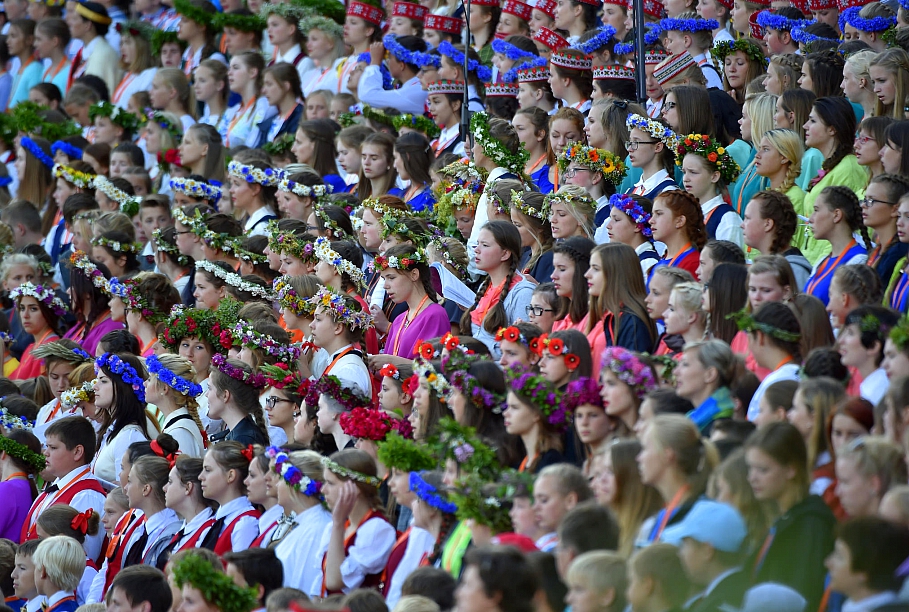May 27 is the date on which the government promised to make a decision on the XII Latvian School Youth Song and Dance Festival, but the issue was not included in today’s agenda. There is no decision yet, and it is waiting for both those who are in favor of relocating the holiday and those who are in favor of organizing an e-holiday. The latter in favor of e-festivals often cite the threat of a tradition that has been alive for almost a century and a half – even after two world wars, the Soviet occupation and various times of trouble.
Whether or not a virtual song festival is a holiday – a lot of spears have been broken about it lately. Professor Valdis Muktupāvels of the University of Latvia, who also wrote about this almost one and a half century old tradition in the National Encyclopedia, says: e-format can help protect it.
“Regularity is very important to this tradition, in the sense that this daily work, from time to time, culminates in such a culmination, and since the very beginning of the Song Festival, its regularity has been marked, except twice – and there were world wars. Only war can disrupt this regularity, so the question is – is the current situation really comparable to war? I think not, ”says Muktupāvels.
Choreographer Agris Daņiļevičs, on the other hand, argues – tradition is not endangered – and points out: “It is simply very unfortunate that some generation, we are talking about school-age dancers and singers, and if it speaks directly, then 11-12. classes for which this holiday actually goes away because they finish school, they fall out in some way. ” Commenting on the holiday e-format, the choreographer notes: “I just admire the people who do it because I don’t know it, I couldn’t get it ready, I can only work in contact with living people the way it has been all the time.
But I think that if the festival did not take place for 10 years, then in the year 11 Latvians would gather together and sing and dance. ”
Children need motivation to do something, and the song festival is a great motivation – according to ethnomusicologist, musician Asnate Rancāne. “We have heard this year from the leaders of the amateur groups, the leaders of the children’s groups, that it is a big problem that the situation is that the groups are falling apart, and I think that this would be something that would keep those groups together,” says Rancāne. . “I think so about folklore and what is perhaps the most active thing in the field of folklore right now, and that is digitization. No matter how funny it is, the digital age has a big role to play in preserving tradition. I also have two feelings about this e-format in general, but let’s be honest, looking at the rehearsal process, it’s the “Zoom” attempt, maybe that’s not what I’d like to do that night, but after this attempt it takes over a very good, satisfying feeling. And I think that’s also what we could be striving for at this song festival, which would be in a kind of e-format, but the most important thing is that we are all overwhelmed by this feeling of satisfaction after that. “
Professor Valdis Muktupāvels believes that the “Zoom” era will most likely leave another imprint at the future Song Festival: “I see how many different theater performances, concerts take place virtually and it does not look . I think that such a parallel reality is emerging and that it is very likely that some virtual parallel process will continue later. Also at the Song Festival. ”
The offer of the festival has yet to be considered by the government.
As Prime Minister Krišjānis Kariņš (“New Unity”) informed at the press conference on May 27, it is planned to do so on Tuesday, June 1.
CONTEXT:
A scenario for the student song and dance festival has been developed, in which the basic principle is offered e-song festival concept. It is planned that the total program of the festival consists of 15 different events in choir singing, vocal music, instrumental music, dance, visual and visual plastic art, folklore. Events will be recorded on video. The Festive Steering Committee has supported this model, emphasizing compliance with the voluntary principle and epidemiological safety rules.
On May 19, the festive solution was presented to the Song and Dance Festival Council, which did it supported. The Cabinet of Ministers will still consider the solution proposal.
Meanwhile, several municipalities have already announced that they will not participate in the festival due to the precarious epidemiological situation. Also Prime Minister Krišjānis Kariņš stated that the holiday in e-format is not a holiday and a decision should be taken to carry them over to the following year.
Initially, the 12th Latvian School Youth Song and Dance Festival was planned for July 6-12, 2020, but due to the spread of Covid-19 at the end of March last year. decided to postpone the holidays for a year.
–
Highlight text and press Ctrl+Enterto send the text to be edited!
Highlight text and press Report a bug buttons to send the text to be edited!
–
–


